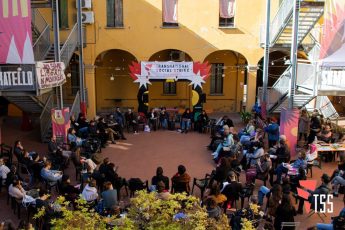
by TSS PLATFORM
Anger is sweeping throughout Europe, which has been turned by the war ideology into the bastion of democracy and freedom against the Russian autocrat and the Chinese dictator. In such a bulwark of democracy, governments like the French one are forcing decisions on crucial issues such as retirement age despite major opposition and beyond all democratic confrontation. This is the Europe at war, that defends its supposed ‘way of life’ and ‘Western values’ by turning a blind eye on the breaches of the rule of law in order not to endanger the common alignment on the Western front. This is the Europe that unleashes any kind of violence against migrants and considers human beings as ‘hybrid threats’. This is the Europe that has welcomed the attacks on workers that Zelensky has implemented a few months after the beginning of the Russian invasion in order to open the gates to foreign investments, that will rule the plans for a reconstruction in the name of property, business and profits. This is European democracy, made of compelled choices taken in the darkness of the governments’ cabinets and deaf to the requests coming from society.
But strikes and blockades are haunting the dreams of those who believe they can obtain discipline and sacrifice in exchange for a security made of rearmament and increased precarization of labor and life. In the UK, an unprecedented wave of strikes for higher wages has stormed the public sector, pushing the government to even propose an anti-strike legislation to try stopping their capacity to damage the business as usual. In Germany tens of thousands of public sector workers went on warning strikes to push for wage increases in face of the rising inflation. German transport sector workers have struck with young activists during the global climate strike, denouncing the prospect that the green transition is paid by asking for sacrifices from them and not employers or investors. For this they have been attacked and accused of irresponsibly walking the line that should divide labour strikes from political ones. In Greece after a train accident killed 60 people and the government tried to blame the rail workers, protests stormed several cities denouncing the murderous effects of years of privatization and attack on public services and public employment.
All over France, today April 6th a new day of strikes and mobilizations has been called against the pension reform extending the retirement age from 62 to 64 years. French cities and countryside have been stormed by protestors for months, and the protests escalated after Macron forced the reform applying article 49.3 and despite the absence of a parliamentary majority. Blocks and strikes continue, public services are disrupted, disorder and anger reign in the République. Millions of workers, migrants, younger and older women and men are refusing to pay the price of the French plans for reindustrialization and for equalizing the State deficits of the EU countries.
We remember when in 2016 François Holland used the same 49.3 article to force the introduction of the infamous loi travail despite a mass movement of opposition. It opened the doors to the precarization of labor as part of the austerity packages imposed by the European Union in the aftermath of the global financial crisis. Since then, in France and elsewhere models of workfare built around activation policies have been based on wide programs of fiscal reliefs for enterprises and employers. Unsurprisingly, making France attractive to investments and industries does not entail any plan for increasing the share of business contribution to retirement funds. It is clear who is supposed to repair the financial situation of the French state.
Since the austerity driven reforms in several EU countries, many things have changed, throwing us in the middle of a global shift marked by threats of escalation of war, rising costs of living and growing inflation, coupled with the effects of climate change and the aftermath of a global pandemic. Today as seven years ago, the reform is presented as a matter of responsibility. A political class that is day after day endangering the future of millions of people, refusing to take decisive measures against the environment degradation and against the possible escalation of war, is accusing the French protestors to be selfish and irresponsible towards their offspring.
While raising the retirement age is presented as a necessity in order not to increase French public deficit, all over Europe in the last year the defence spending has reached the 1,5% of the overall GDP. The resulting costs will outnumber by far even the ambitious €807 million Next Generation EU package released during the pandemic. With an overall budget of €43.9 billion in 2023, the French military budget has increase by €3 billion and it will be the second largest item of government expenditure after education. According to Macron’s plan, by 2030 France’s military budget will double compared to 2017, when he took power, because one needs to be realistic and ready for more brutal and more numerous wars.
In light of this, sacrifice is the word that circulates in the cabinets and headquarters of Europe and France. As a matter of fact, after opposing the legitimacy of the squares to that of the ballots and leaving it to the force of the police to decide which one is going to prevail, the French president has appealed to the realism that anyone would expect from a commander-in-chief. Forgetting the tens of thousands who died because production could not stop, he has maintained that the pandemic spoiled French workers because they got used to be paid by the State while not working, a little bit like soldiers on leave. Now things need to be made right and ranks need to be tightened. Let the people play with their democratic daydreams, he will continue to work “at full power”, because he has the tough job of dealing with emergencies such as the water shortage and the geopolitical situation in comparison to which the rage of the squares is just laughable. First the pandemic, then the war in Ukraine and inflation: too many expenses made to protect the people, now they need to pay back and obey while forced choices are made. But, against Macron’s claim to transform workers, migrants, men and women into soldiers of labour, their response en masse is the strike.
We participate in and support the French movement, and we know that the current wave of struggles and strikes goes well beyond France. We need a collective effort to open spaces where the different forms of refusal of the sacrifices and discipline that seem to be the unquestionable consequence of the transnational situation marked by war, fiscal constraints and climate degradation can resonate with each other. It’s up to us to make each strike, each uprising, each protest a voice on the side of all those who are refusing a future decided by the champions of the militaristic realism that has invaded our political imagination since the beginning of the Russian invasion of Ukraine.





